New York lawmakers recently made three changes to the Property Condition Disclosure Statement (PCDS) that real estate sellers sometimes gave to buyers:
- Effective June 14, 2023, sellers must disclose indoor mold history on a PCDS.
- Effective March 20, 2024, sellers must disclose flood risk information to potential buyers on a PCDS.
- Effective March 20, 2024, sellers are required to provide the PCDS; they can no longer give buyers a $500 credit in lieu of providing a PCDS.
(1) Sellers Must Disclose Indoor Mold History on PCDS
On December 16, 2022, Gov. Hochul signed A03714/S05097-A from the 2021-2022 legislative session into law.
Effective June 14, 2023, sellers must disclose indoor mold history on a PCDS.
The legislation added question 19-a to the PCDS, requiring sellers to answer whether the property has been tested for indoor mold:
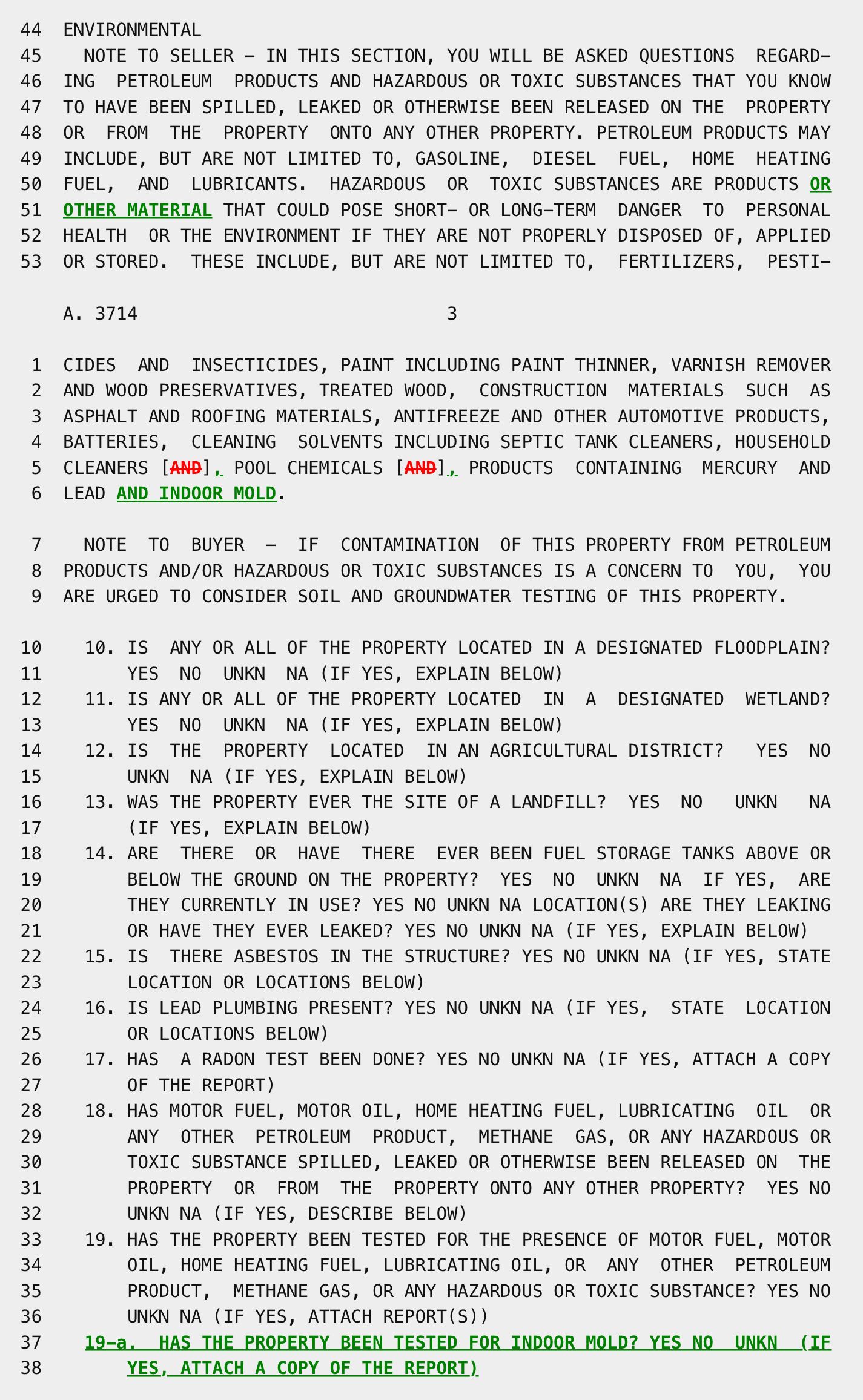
The legislation has the following justification:
Indoor mold has been referred to as "killer mold", this is because the health risks associated with certain types of mold are tremendous. Inhalation of a wide variety of fungi can lead to or exacerbate existing allergies. Mold has also been found to cause toxic effects or infections. Currently, there are no government standards or practices for detection, prevention, and/or remediation of indoor mold. The public needs to be aware that indoor mold is a threat and what to do to clean up indoor mold if found on their property. The Department of Health can serve this need by creating guidelines for the public to identify, deal with, and prevent indoor mold.
The history of mold must be disclosed in order to prevent further mold growth. Health risks are increased in property where indoor mold is hidden or not identified as dangerous. This is exactly why new property buyers need to be informed of past indoor mold growth, as they are with past records of lead paint and other hazardous materials contained in the property. In the case of public housing, it is equally important the property is free of indoor mold, and that procedures exist to deal with the detection, clean up and prevention of mold.
The change to the PCDS in A03714/S05097-A doesn't go as far as A415, another legislation that was introduced in the 2021-2022 legislative session, which would have also added question 19-b to require disclosure about current mold conditions: "19-b. Is there indoor mold on the property presently? (If yes, state location or locations below)"
The screen capture above shows the changes to the PCDS that were made by A03714/S05097-A. They reflect the current state of the PCDS today, where Question 19-a is the mold history question. But, as I will discuss in sections (2) and (3) below, on September 22, 2023 Gov. Hochul revised the PCDS again and those changes will become effective on March 20, 2024. When the changes become effective, Question 19-a will be renumbered to Question 27:

(Hani, 10/5/2023: Special thanks to Rich Weiss, a fellow New York attorney, for suggesting that I show that question 19-a has been renumbered to question 27--a change that was passed into law on September 22, 2023. and will become effective on March 20, 2024.)
(2) Sellers Must Disclose Flood Risk Information on PCDS
On September 22, 2023, Gov. Hochul changed current law by signing A1967/S5400 into law, Effective 180 days from September 22, 2023, which is March 20, 2024.
The legislation adds seven flood-related questions to the PCDS:
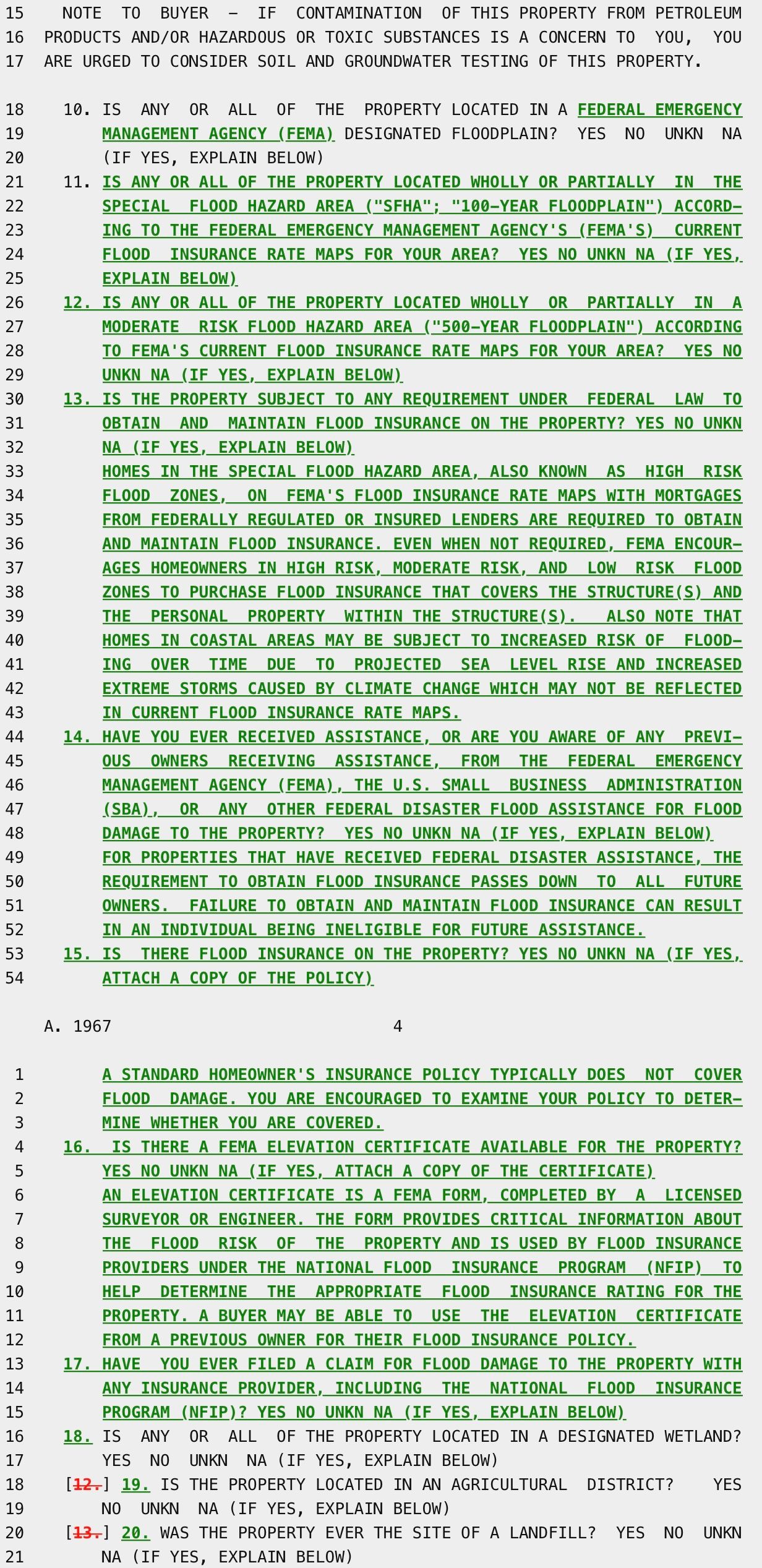
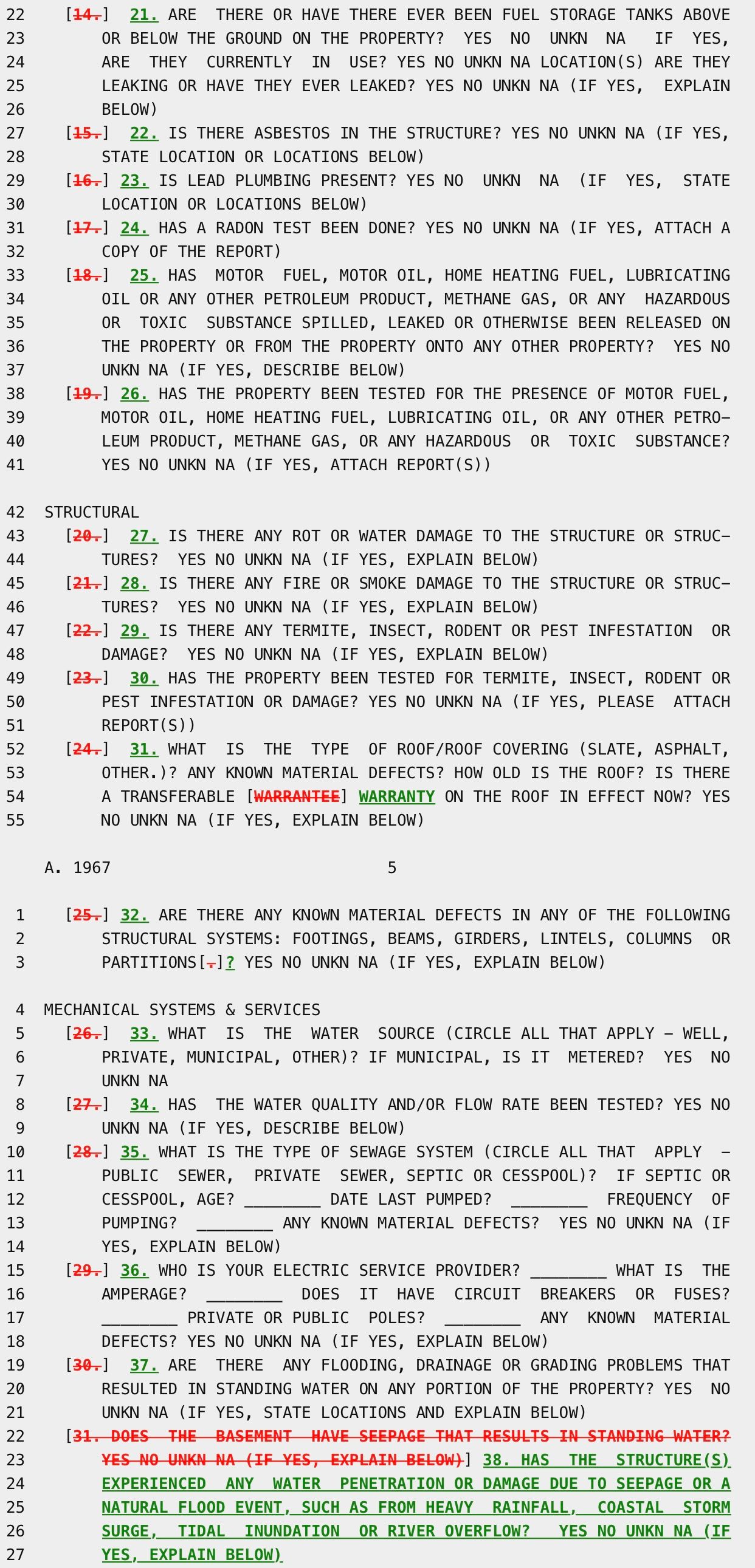
The flood disclosures in the PCDS are in line with flood disclosures that became required for all residential leases on June 21, 2023 (A7876-A/S5472-A from the 2021-222 legislative session).
The Waterfront Alliance and the Rise to Resilience Coalition championed the changes to the PCDS in A1967/S5400. They state that they "are thrilled to have spearheaded advocacy around the legislation."
"A home that has flooded once is likely to flood again," asserts Cortney Koenig Worrall, President and CEO, Waterfront Alliance.
The flood disclosure is necessary because of client change, proponents argue. "As rain events and flooding become more frequent and severe due to climate change homebuyers in the Long Island Sound Region and across the State of New York must have the information they need in order to protect their assets and their families," says David Ansel, Vice President of Water Protection, Save the Sound.
(3) Sellers Must Give Buyers a PCDS and Cannot Opt Out By Giving $500 Credit
Under current law, sellers have two choices: (1) They can complete a PCDS and give it to a buyer, or (2) they can give a $500 credit against the purchase price. The choice is typically dictated by local custom. Effective March 20, 2024, sellers have only one option: They must give buyers a PCDS.
Currently, in downstate New York, sellers generally give a $500 credit, not a PCDS; but the practice was different upstate. J Philip Faranda points out this distinction:
All real estate is local, and it is rare for buyers in the Metropolitan Area of New York City (5 Boros, Long Island, Westchester, Hudson Valley) to get the form, while a $500 credit is almost unheard of upstate. This might be due to the fact that New York area lawyers don't like volunteering information when a $500 credit is such a small percentage of overall proceeds to avoid it. It might be other reasons; I don't know. I cannot recall a transaction where a listing of mine provided the form. Once the predominant view of attorneys on the matter is one way or the other, the clientèle tend to agree.
On September 22, 2023, Gov. Hochul changed current law by signing A1967/S5400 into law, effective March 20, 2024, sellers must give the disclosure statement.
RPL § 465 was revised to remove a seller's option to give a buyer $500 credit against the agreed upon purchase price in lieu of delivering a PCDS:
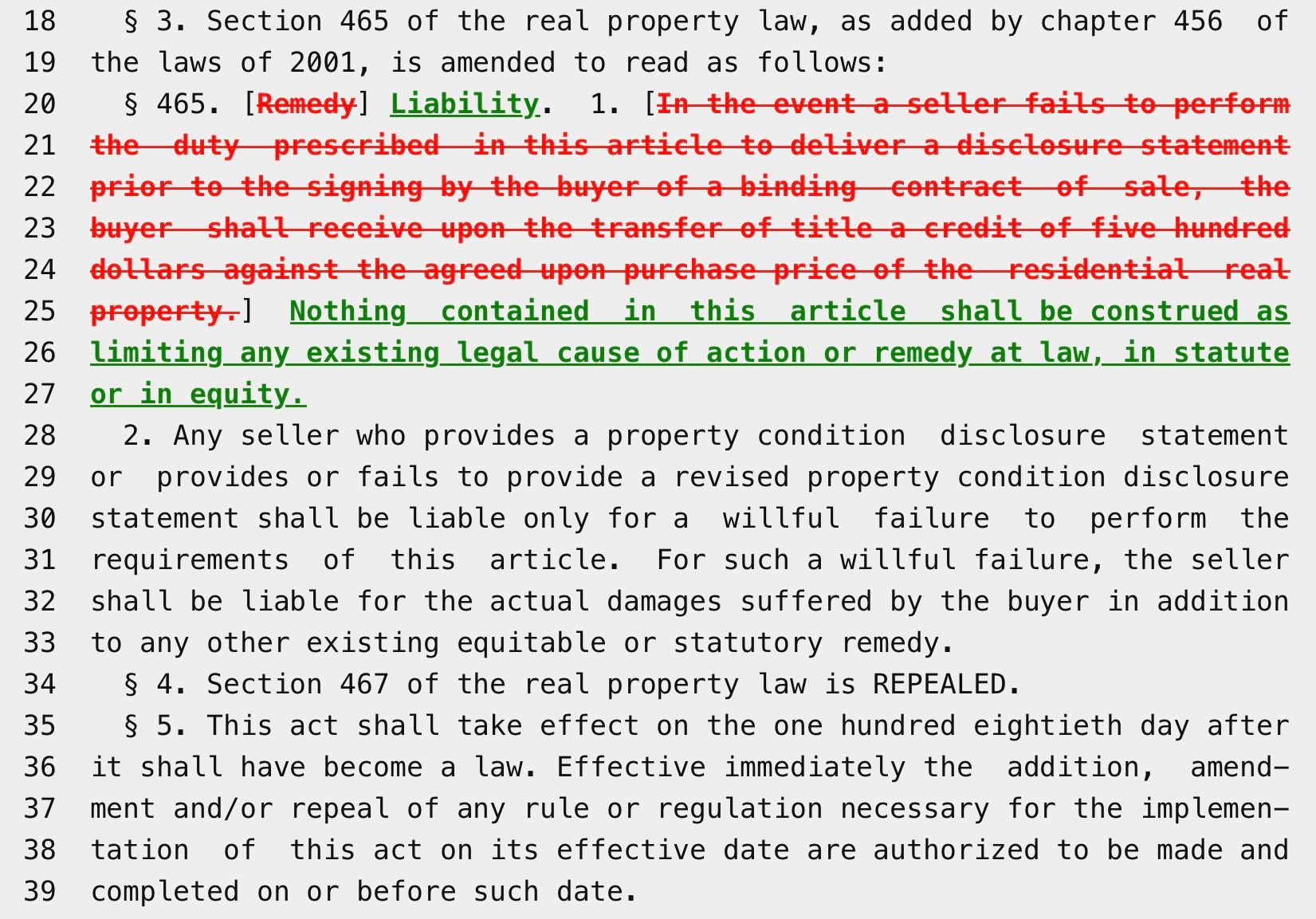
The statutory Property Condition Disclosure Statement set forth in RPL § 462(2) no longer allows a $500 credit. This screenshot of the legislation shows how the statute has been revised:
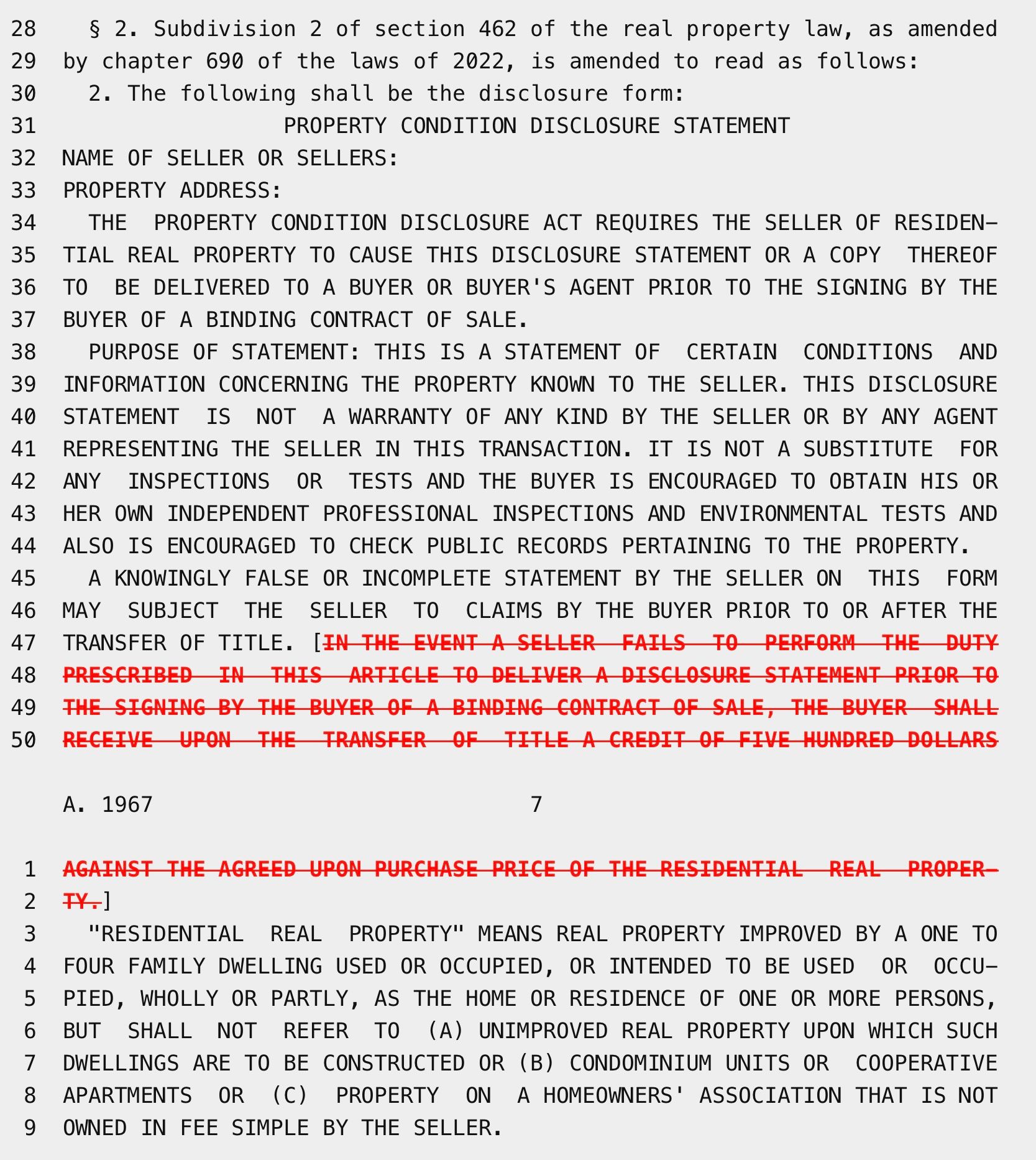
The changes to RPL §§ 465 and 462(2) are effective 180 days from September 22, 2023, which is March 20, 2024.
There are downsides to repealing the option for the sellers to "opt out" from providing the PCDS by giving a $500 credit toward the purchase price. "Not having an 'opt out' places a burden on sellers of inherited property and other situations where the seller has little history (or diminished memory)," wrote one real estate lawyer on the New York State Bar Association's Real Property Law Section's listerv.
Trend: From Caveat Emptor to "Right to Know"
The recent changes to the PCDS show a change in real estate law, favoring buyers.
Traditionally, the principle was caveat emptor ("buyer beware").
The changes force sellers to make certain disclosures. They embrace the buyer's "right to know."
But requiring sellers to provide a property condition disclosure without the opportunity to opt out might have unintended consequences. "I wish this piece of paper could prevent fraudulent concealment (which is a separate tort already), or affirmative misrepresentation. It won't, of course. It will serve to get honest sellers, who have no technical expertise, sued by purchasers with buyers' remorse," writes an experienced real estate lawyer on the New York State Bar Association Real Property Law Section's listserv.
"If the aim is to get sellers to pay for home inspection or invite in the building department, then say so," writes a lawyer on the listserv. But even mandated home inspections might not make sense in the context of short sales and land-poor sellers.
"Frankly, consumers might have been better served with an increase in the credit, as one would best rely on their own inspector or engineer," writes another lawyer on the listserv. Yet, another pointed out that even this suggestion might miss the mark: "I am not sure that a significant increase would result in what the law is intended to do - allow the buyer to make an informed decision."
Another lawyer on the listserv advised fellow real estate lawyers to update their retainers. "Well one thing with the time frame and how long closings can take: our retainers should be reviewed immediately and made sure we take no responsibility for the completion of the form or review of it, nor representation if there are any problems after closing and if there are before closing it is additional fee."
Hani Sarji
New York lawyer who cares about people, is fascinated by technology, and is writing his next book, Estate of Confusion: New York.





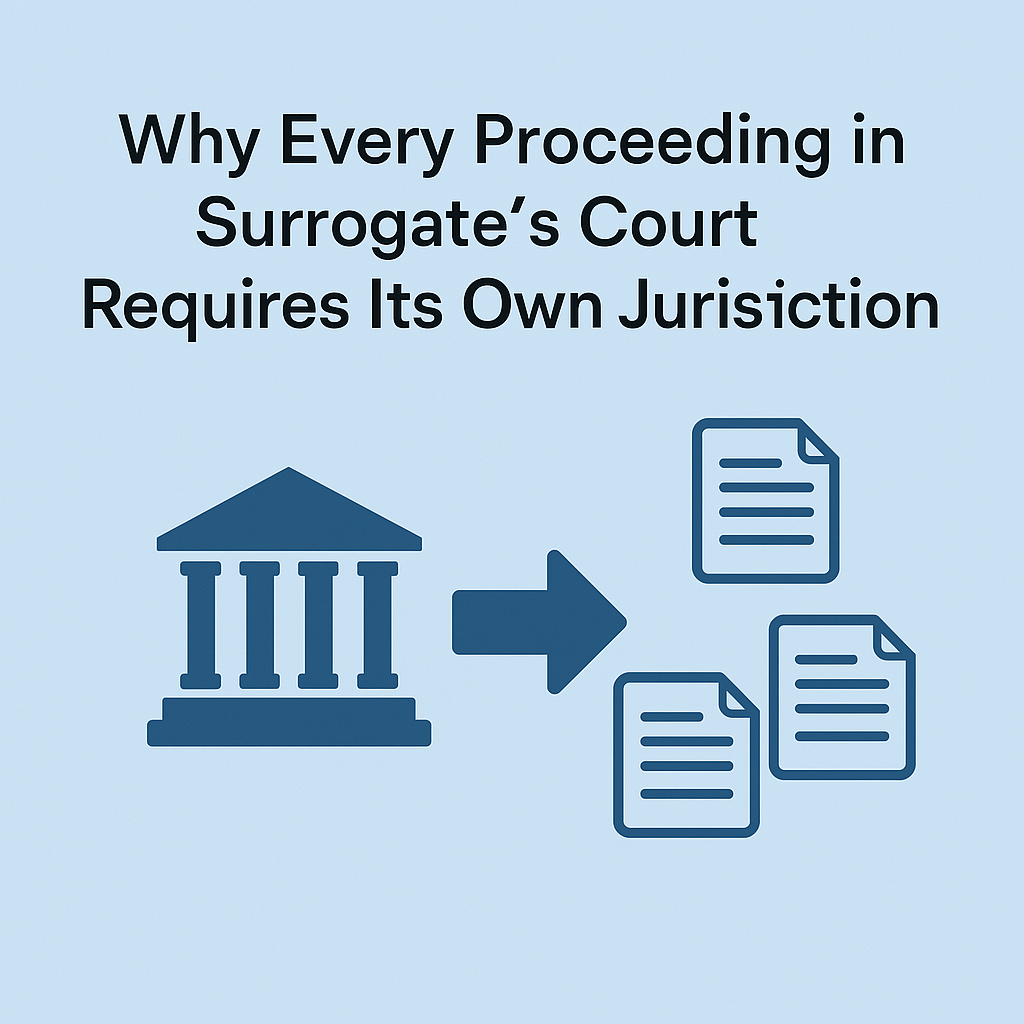
Leave a Comment